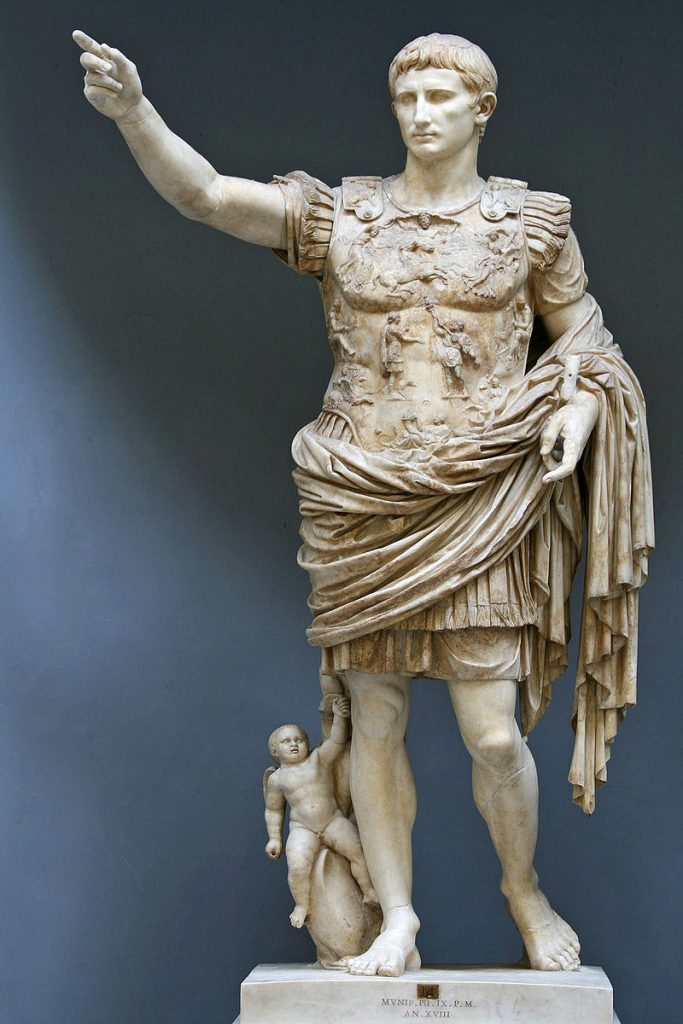Forty-five years of unopposed rule seems an unlikely feat for any ruler in Roman history. After a civil war that lasted thirteen years, treachery, and chaos, Rome finally had an emperor it could count on. Rome’s first emperor was born as Gaius Octavius in 63 B.C.E. His family was unlike any other in Rome at the time; they were humble and kind to say the least.1 After the late dictator of the fallen Republic, Julius Caesar, adopted and named Octavian his heir in 45 B.C.E., he was thenceforth renamed Gaius Julius Caesar. His name was changed again in 27 B.C.E. to Augustus Caesar by the Senate.2 It was with this name Augustus was remembered for, and he stayed in power for decades. Augustus stayed in power for so long because he was intelligent, refused extravagant titles, was recognized as god-like, and single handedly restored Roman architecture and government.

While trying to consolidate his power in Rome after Caesar’s assassination, Augustus looked to Marc Antony, then in Egypt, as an ally, and formed the Second Triumvirate with him and Marcus Aemilius Lepidus. Their shared power inevitably led to differences, but Augustus stayed level-headed, and intelligently went around Antony’s and Lepidus’s authority. Together, they defeated the last of the Republic forces and Sextus Pompeius (son of Pompey the Great).3 Soon after, Augustus and Marc Antony split up the Roman Empire and co-ruled, until Augustus caught wind that Antony was planning on creating an independent monarchy in Asia Minor. Seeing an upper hand in this situation, Augustus exposed Marc Antony’s intentions to the Senate. This led to Rome seeing Antony’s actions as an act of war, and the Senate did not hesitate to declare war on Antony and Cleopatra in 32 B.C.E. This act ultimately led to the demise of Egypt’s last Ptolemaic rulers, since Antony and Cleopatra committed suicide before being captured by Roman soldiers. Without Augustus’s intelligence, Rome might have had another civil war on its hands, had Antony been able to take control of Rome. The defeat of Antony gave Augustus complete power over Rome and its people.
Fearing another civil war, Augustus steered clear of naming himself as dictator or sole leader; instead, he took upon himself the role of consul or tribune. For thirteen consecutive terms, Augustus remained as head of the Roman Empire and refused extravagant titles. He was often called princeps, or “first citizen.” This name delivered the image Augustus wanted to uphold. His identification with the common people of Rome is what made his rule accepted in Roman society. Even when Augustus was given supreme power, he wanted to be called princeps and continued to defer to the Senate to keep the peace.4
Many of Augustus’s subjects saw him as god-like. Halley’s Comet was said to have appeared during the beginning of his reign, and Augustus claimed it was Julius Caesar’s spirit going to heaven. Rumor had it in Rome that if this were true, then Caesar was a god, which would make Augustus the son of a god.5 In addition to Augustus’s public persona, he hesitated to remove any who were unfit to serve beneath him. He routinely removed and exiled from his Empire any who threatened his legacy. He was swift and just in the actions he took with any who violated Roman law or morals. For example, after making adultery illegal in Rome, Augustus is said to have sent his daughter into exile for adulteries she committed.6
Make Rome Great Again would have been a just campaign slogan for Augustus. He did exactly that by restoring Rome’s architecture and government. In the autobiography by Augustus called, “Res Gastae Divi Augusti,” which translates as the deeds of the divine Augustus, Augustus tells of his good deeds to Rome throughout his reign as Emperor. In this autobiography, Augustus claims to have restored “eighty-two temples of the gods in the city by the authority of the senate.”7 It is said that Augustus found Rome as a city of brick and made it a city of marble. He also kept the Pax Romana, or Roman peace, alive and well throughout his rule. This led to an improved economy and caused the arts to flourish. Some lasting artists from Augustus’s rule include Horace, Ovid, Livy, and Vergil. The Senate was grateful for all of Augustus’s achievements for Rome, and they gave him the title of pater patriae—father of his country in 2 B.C.E.8
Through his ambition and expertise, Augustus single-handedly made Rome one of the greatest empires of all time. The amount of time Augustus ruled was unparalleled in the history of Rome. Augustus successfully kept his power with his military intelligence, refusing extravagant titles, being seen as god-like by Rome, and making Rome peaceful and prosperous.
- Patricia Southern, Augustus (Roman Imperial Biographies) (New York: Routledge, 2013), 6. ↵
- Salem Press Biographical Encyclopedia, September 2015, s.v. “Caesar Augustus,” by Michael Witkoski. ↵
- Salem Press Biographical Encyclopedia, September 2015, s.v. “Caesar Augustus,” by Michael Witkoski. ↵
- Ancient History Encyclopedia, August 2010, s.v. “Augustus,” by Joshua J. Mark. ↵
- Nandini Pandey, “Caesar’s Comet, the Julian Star, and the Invention of Augustus,” Transactions of the American Philological Association, vol. 143, no. 2 (2013): 407. ↵
- Salem Press Biographical Encyclopedia, September 2015, s.v. “Caesar Augustus,” by Michael Witkoski. ↵
- Thomas Bushnell, The Deeds of the Divine Augustus, transl. Thomas Bushnell (Cambridge, Mass: Internet Classics Archive, 1996), 20. ↵
- Salem Press Biographical Encyclopedia, September 2015, s.v. “Caesar Augustus,” by Michael Witkoski. ↵



43 comments
Emmett Pena
Augustus was the hero Rome thought it needed after the fiasco of having Caesar as a ruler over them for years. The Pax Romana was Rome’s time of peace away from war and Augustus, being the one who first established it, was seen as a worthy leader and was given powers to stay in office. Given the title of princeps, Augustus formed a relationship with the public. Augusts was able to do what Caesar couldn’t, win the people and senate over and have their full support.
Patricia Arechiga
I have always sustained a soft spot for the roman empire, as I remember watching the Tudors on Netflix and loved in. I have always found the leadership and power the roman empire sustained beyond fascinating considering both the time period and social structure / mindset that was sustained during their time of rule. Augustus inclusion of his council and being open minded about changes / opinions on certain things truly allowed the empire to sustain a solid government and society. The power of inclusion truly leads to a fair rule.
Emmanuel Ewuzie
The government Augustus conducted is slightly reminiscent of a democracy as he always heeded advice from a council. Instead making his kingship a solo affair, he made it a team effort but he, swiftly, cut off weak links or weeds to the empire, concurrently, keeping the roots strong. By appealing to a council, he created a notion to the idea that there was a check to his power and he was reasonable and willing to listen while in reality, he could still do whatever he wanted.
Diego Terrazas
Augustus is rather intelligent. Not only did he see throughout Marc Anthony’s plans, but he also refused to accept glamorous titles that made him seem like an emperor. It was the right move to defer many important decisions to the senate so that it seems like he does not have much influence over them. He understood well that it is better to be popular with the people by acting like everyone else rather than a ruler.
Christopher Metta Bexar
As a lot of the other comments suggest Augustus was a clever man. As portrayed in the BBC series ” I Claudius” his only weakness appeared to be his queen Livia.
Augustus maintained his empire by playing on the goodwill of his adoptive father Julius Caesar as well as betraying his friend Marc Antony.
My reading of the story suggests he was indeed power mad as some have called him , but still a very clever man and strategist.
Pamela Callahan
I find it interesting that Augustus went by the term meaning first citizen. I think that shows a lot about him at the beginning of his leadership. Shortly after however, he became known as almost like a god, which I personally thought to be a drastic change from his original view by the people. His story was very interesting and I think it’s very impressive that he had such a major impact on the Roman empire.
Raymond Nash Munoz III
As a whole the article was great, in the fact of its context and structure. Though, there were few instances in the introduction that I felt were a little grammatically confusing, for example, “After a civil war that lasted thirteen years, treachery, and chaos, Rome finally had an emperor it could count on.” It wasn’t so much that the sentences were grammatically incorrect, but they just could’ve been rephrased to make it flow better. Though, the few confusing sentences did not prevent the author from conveying the great story of Gaius Augustus Caesar.
Daniela Duran
This was a very interesting article. I believe that Augustus’ humility is admirable, because very few powerful people like to retain their humble roots, and avoid being called prestigious titles. I would dare to think that, to some extent, Augustus’ success was due to his ability to remain humble, and relate easily with lower classes; perhaps this made him more empathic, and hence more likeable amongst the Romans. His rule was not only incredibly long, but also incredibly successful, according to what I rad, and I truly think that he deserves recognition as one of the propellers of the Roman empire and its brilliant success!
Ysenia Rodriguez
Roman history is not something I look forward to learning about however this article kept me engaged and pushed me to continue reading. I never knew Augustus played such a major role in the rebuilding of Rome. By rejecting any superior title given to him, Augustus kept a low persona which allowed him to rule over Rome with trust and love from his people. He also acted very swiftly to get rid of any threat against him and his empire. Great article.
Roman Olivera
This was a great article. What stood out t me was that slogan that he had, Make Rome Great Again! Sounds familiar. President Trump’s slogan is, Make America Great Again. Coincidence? Are we the new Empire that will fall from greatness? It’s crazy how history seems to come full circle. Though in his mind Augustus was truly trying to make change in Rome for the better, he was still trying to maintain his selfish god complex ambitions and this would ultimately be his undoing.